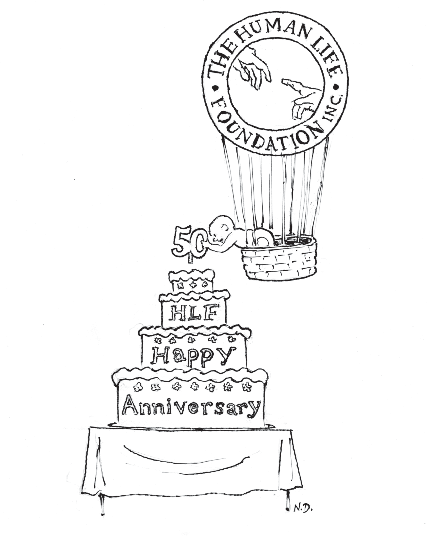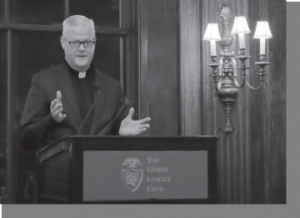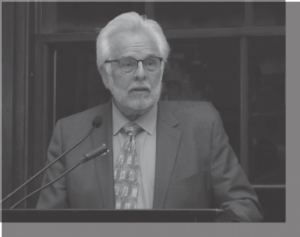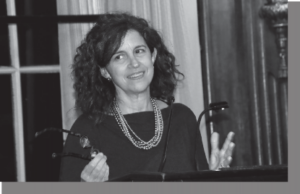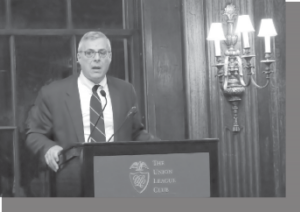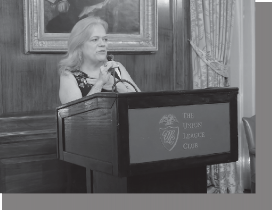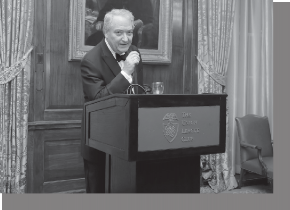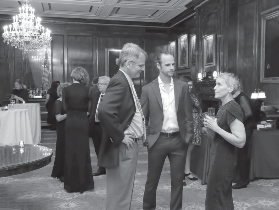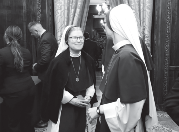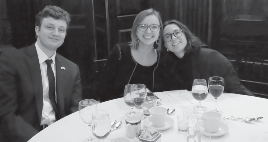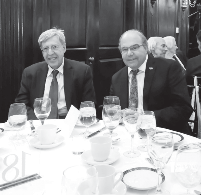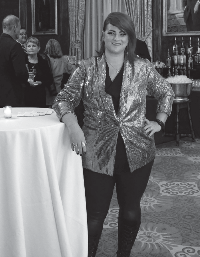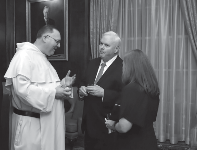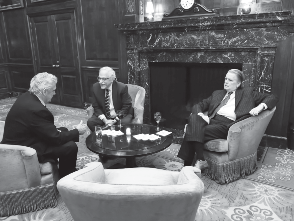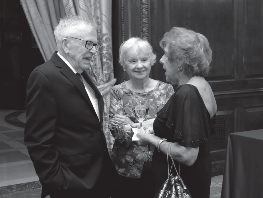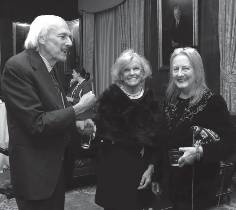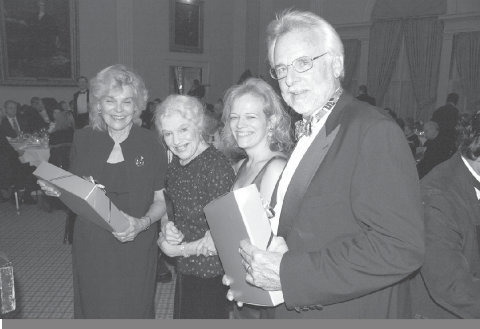The Human Life Review’s 50th Anniversary Gala
50TH ANNIVERSARY GALA
November 13, 2024
The Union League Club, New York City
At mid-day on November 13th, the day of our 50th anniversary gala, Amtrak had a complete shutdown of service between Wilmington, Delaware, and New York City. Sadly, our co-host, and Great Defender of Life, Helen Alvaré, was stuck on a train in Wilmington and didn’t make our event! She did send us the transcript of her remarks via phone; her fellow host Jack Fowler started by explaining her absence and later reading her salute to the late Cardinal John O’Connor to our guests.
What follows are excerpts from the dinner remarks. You can watch the complete dinner video, as well as our short film and slideshow, on our website, at https:// humanlifereview.com/great-defender-life-dinner/special-event-great-defender-lifedinner-2024/
JACK FOWLER:
I had the great honor to work with Jim McFadden and so many other good people at the Human Life Foundation and the National Committee of Catholic Laymen and the Ad Hoc Committee in Defense of Life. It was a great group. Many people are going to be mentioned tonight, named and noted. I want to talk about one of them in particular, before we get started. Jim McFadden was a work horse and a bulldog, but there is no way that we would be here tonight to mark the golden anniversary of this revered journal if he did not have a right hand . . . helping him produce the Human Life Review, Lifeletter, and catholic eye, and raise funds for baby-saving groups—as we called them—that were holding the barricades in the battle against the culture of death. That right hand was founding publisher Ed Capano, who helped Jim in all these efforts while he performed various duties as associate publisher (and later publisher) at National Review—a 45-year career that ended with Ed as NR’s chief executive. I think it’s very fair to say that there are people who are alive today because of the efforts of Jim and Ed; they gave hope and actual aid to women who were otherwise contemplating abortion. What a legacy for this man, so integral to the creation and growth of the Human Life Review. Ed, who was also a longtime HLF board member, could not be with us tonight, but I thought it well worth it, on the 50th anniversary, that we make note of his essential contribution to this great, great cause. So give a little applause for Ed Capano. [Applause] . . .
REV. GERALD MURRAY:
Our thoughts tonight turn to gratitude. Gratitude for what the McFadden family has been doing for fifty years. Gratitude for this offspring of National Review—conservatism at its best—protecting human life, upholding a civil order based on just laws—natural law—refusing to accept the exercise of raw judicial power to create a spurious constitutional right to kill innocent human beings in the womb.
Gratitude for brilliant writers who use their intelligence to refute and demolish falsehoods justifying the unjustifiable. Gratitude for the perseverance in the fight of the staff of the Human Life Review. Gratitude for our own gift of life and for the gift of truth that instructs us that we must not tolerate the moral, legal, and social injustice of abortion because “that is just the way things are.”
We stand with our unborn brothers and sisters and pledge to keep fighting to end the grave injustice of legalized childkilling by abortion. We stand with those threatened by euthanasia, now known as medical assistance in dying.
It is good to stand for what is right. The Human Life Review has done that and will continue to do that. May God favor and bless this fifty-year-old champion of all that is true, good, and beautiful.
WESLEY J. SMITH:
Thank you all for being here at this important event and thank you, Maria and Anne, for inviting me to say a few words.
You know, as I pondered what I would say tonight, I thought about what it is that people with excellence in advocacy—what are their attributes. I came up with five.
One is integrity. Two, know your stuff. Three, be unremitting, never quit. Four, don’t be expedient. That’s a hard one sometimes—don’t be expedient. And five, have a willingness to sacrifice.
And I have to say the Human Life Review epitomizes each and every one of those five attributes. And so do two former defenders of life, Great Defenders of Life, that I’ve been asked to speak a bit about today, Nat Hentoff and Rita Marker.
The late great Nat Hentoff was my friend. I don’t remember exactly how and when it came about, but he would call me when he was writing about euthanasia for quotes, and at some point, I came to New York and he wanted to have dinner, and it began a friendship that was mostly conducted over the phone. But anytime I was here in New York City, he and I would get together. He was such an iconoclast, in addition to being a jazz expert—internationally renowned in that regard. He called himself a Jewish, atheist, leftwing, civil-libertarian prolifer. Accordingly, his work castigated legalized abortion, partial birth terminations, unethical experimentation on disabled babies, health care rationing, the intentional dehydration of Terri Schiavo, euthanasia, and other life disaffirming issues and policies that reared their ugly heads over the last thirty or so years of his writing career.
I think Nat deserved the Pulitzer. But he ruined his opportunities because he took those positions. And eventually because of those positions he took, he lost his 50-year writing gig at the Village Voice, he was fired, in essence, from the Washington Post, and ended up excluded and marginalized in what we now might call the mainstream media. While the mainstream viewed Nat’s human exceptionalism advocacy as an embarrassing anomaly, prolifers received it as sweet incense. Nat’s ongoing apologia compelled the Human Life Foundation to name him its Great Defender Life in 2005.
Nat Hentoff epitomized the power of life. So, thank you my wonderful Jewish, atheist, civil-libertarian, left-wing prolifer friend. We will not see your like again.
Post Script: If I might add a brief point of personal privilege: None of us can judge the state of another’s soul. And as others who knew Nat have stated, I never fully believed the atheist part of the iconoclastic self-description. I teased him gently about that whenever I was with him, and his eyes would just twinkle. As I think back on our all-too-brief conversations, as I reflect on what he stood for and his shimmering integrity, I still don’t.
My great friend and mentor, Rita Marker, a Great Defender of Life in 2008, passed away two weeks ago. I don’t know if any of you knew Rita. Yes, Rita was one of the greats of anti-euthanasia advocacy. She lived to be 83. And she died after a long illness.
Rita was in Europe in the mid-1980s, and out of curiosity attended an International Right-to-Die convention. I always think of her as a horse smelling smoke and rearing, because what she heard so alarmed her that she and her husband and soulmate Mike Marker formed the non-profit International Anti-Euthanasia Task Force, which was later renamed the Patients Rights Council. Along with a loyal staff, Rita began decades of work pushing back against that dark agenda.
Not every great public policy activist becomes a household name. Rita was not interested in notoriety or fame. Effectiveness was her lone star, that and personal sacrifice. For as long as she was physically able, she gave all she had to the cause. She had stage fright, but she spoke countless times to large and small venues. She was terrified of flying, yet she traveled the world speaking against euthanasia and in favor of compassionate care.
Rita was a devout Catholic, a daily communicant. But she insisted that the task force opposition to assisted suicide be focused through a human rights and secular lens.
Rita did not have a professional degree until she decided that she could be most effective by becoming a lawyer. She attended a mail-in law school, while still working full-time for the task force, and passed the California Bar Exam, the nation’s most difficult, on the first try.
Rita’s life was full. She is survived by 7 children, 29 grandchildren, and 13 great grandchildren.
So rest in peace, Rita. You fought the good fight. You finished the race. You kept the faith. You served your purpose. And the world is so much better for you having been in it.
HELEN ALVARÉ (TRIBUTE TO JOHN CARDINAL O’CONNOR):
It’s a great honor even to be permitted to be a person allowed to honor John Cardinal O’Connor. I’ll bet every single one of you has a fond recollection of him . . . I only hope I can capture some of what we love so much about him in a relatively few words.
I have been thinking of him a great deal recently—a great deal at this time in our national saga, when so many people seem to have forgotten what abortion is and are therefore installing it into laws without even those basic guardrails that would protect the woman involved, even if the child is not allowed to count for anything.
I have been thinking of how the Cardinal manifested intelligence and reason when they said we were stupid.
About his standing against hatred based upon religion: for every woman who had the good fortune to work in his orbit; for every pregnant woman in turmoil, and against the legalization of killing vulnerable children in the womb . . . not only in the same lifetime, but on the same day and in the same breath. And he did all this when they said we were not consistent in a principled way or claimed we were retrograde and anti-woman.
I think about his standing large when they said we had no one of any influence or stature on our side.
And, of course, his standing courageous at a time of the abortion debate when all the “powers that be” were telling us we were finished . . . that we could not possibly succeed or even remain visible against the inevitable tide of history.
And then, like the Father he was, he left us a legacy—including so many of us here who were taught, encouraged, mentored by him. My gosh, I was 29(!) when he decided to put his faith in me as a voice for the Church and then guided, cajoled, praised, and, yes, occasionally rebuked me into improving and strengthening that voice. He formed me in a permanent way.
But, especially, he left us the spectacular legacy that many of us know simply as “that group of women we cannot say no to,” or “some of the most joyful, fun-loving, talented women we know,” or “the hardest working nuns in show business”—all of which is to say the Sisters of Life.
So many of these sisters have been mothers, sisters, friends to me and to you—imagine what is felt by those women who encounter them when they are at the very end of their rope, when life itself is on the line. Imagine their reaction when they meet women whose hearts and homes are immediately available to them—in the way Jesus was available, in the way a mother is available.
So thank you, Cardinal O’Connor, not only for all you did while you were by our side, but for your legacy, especially your living legacy, your daughters and sons who, with so much gratitude to you, continue the pro-life struggle, assured that we have reason, truth, human rights, you, and the Lord, right by our side.
JACK FOWLER:
I want to thank Dale and Wendy Brott, who are not here tonight, for hosting the William F. Buckley Jr. & James L. Buckley level . . . Bill was so supportive of the effort Jim McFadden undertook right after Roe. I worked for Jim at the office of National Review, but not for National Review. Very few companies would do that, but Bill knew the importance of the issue and the passion that Jim and others there had, so it’s very deserving that he be recognized at that level. Jim Buckley, who was awarded and spoke here [as the Foundation’s 2012 Great Defender of Life]—does anyone know a greater man, a more saintly man than James Lane Buckley? He was the holiest—he was an angel! . . .
Okay, for a moment now I’m identifying as Helen Alvaré: “Helen thanks the Knights of Columbus for hosting the Cardinal O’Connor level,” and I want to say that the Knights, the National Office, have been great, great supporters—of course, of the cause we fight, but also of the Foundation and the Human Life Review. Jim McFadden and Carl Anderson, the former Supreme Knight, were great friends back when Carl worked on Capitol Hill and then when he worked in the Reagan White House. Carl was always a tremendous supporter, and that this has carried through to the current leadership is just a beautiful thing. So, we are very appreciative of the Knights of Columbus’s ongoing support for the Foundation. [Applause] . . .
MARIA MAFFUCCI:
First, I want to thank Pat and Bob O’Brien for hosting the Faith & Jim McFadden level. Obviously, Faith and Jim are my parents. Blessed memory. I am one of five children. My older brother, Robert, who also worked with us, died 30 years ago . . . I grew up kind of wondering how I could ever measure up to either of my parents, because they were both so smart and such great writers, though very different. Dad was, as Jack said, a bulldog, and my mom was serene. It is a great privilege to follow in their footsteps, and I think of them often, as well as Robert, who I miss a lot. I think they’d be very happy about this gathering, and I am grateful to all of you that we made it—and through some very difficult years—to this our 50th anniversary. . . .
I want to thank Captain Hayes and family for hosting the Nat Hentoff level. As you can see in your program, we also have a “Name Your Own Hero” level, and I would like to announce that the Charles and Mary Crossed Foundation has honored Feminists Choosing Life of New York as their pro-life hero. FCLNY members were tireless in their efforts to defend against Proposition One [Equal Rights Amendment] in New York State, which unfortunately passed, but what they did educated lots of New Yorkers about the potential threats the amendment could pose. Michele Sterlace Accorsi is the Executive Director: She is a fantastic woman, and she did a wonderful job. She is not here tonight, but Margaret Colin, who is with us tonight, is an honorary chairperson of Feminists Choosing Life of New York, so we will present her with the award. [Applause] . . .The late Barbara Connell was the best friend of my mother, and she left the Foundation a generous gift from her trust. As a trustee, my pro-life hero is Destiny Herndon de la Rosa. [Applause] I discovered her in 2016, at a time when I was getting kind of burned out, and she opened new doors for me, including introducing me to many wonderful women in the movement. Destiny, I also have a message from Helen [Alvaré]. She said, “Tell Destiny she was one of the HUGE highlights I was looking forward to this evening; she allows me to breathe with relief that the pro-life movement still has its pure hearts and its fiery spirit.” And that’s Destiny. [Applause] . . .
JACK FOWLER:
As a donor, I am also in the position of naming a pro-life hero, and my hero is my dear friend and my former colleague at National Review, Kathryn Jean Lopez. [Applause] There are three things I want to say. First is the obvious, which we all know: Nobody in the last 25 or 30 years—
even when she first came to National Review—has written so much, and so relentlessly, in defense of the unborn, and on related issues. The last few years she has been a tireless fighter on behalf of foster care reform. She is a very unique person . . . One day Kathryn and I were coming from some event, walking down 47th Street, and coming up the block were two Sisters of Life. I got so excited—some nuns coming our way—and the two sisters were so excited because KLO was coming their way. [Applause] It’s all deserved. On social media Kathryn is constantly posting “I saw somebody”— sometimes a homeless person—“I saw someone who needs a prayer.” Many people follow Kathryn, and she is constantly eliciting prayers from us for people we don’t even know. When Kathryn says pray for somebody, you are going to stop whatever you are doing, and you are going to pray. She just has that power, and deservedly so, over people. She is simply one of the most special people I know, someone I have had the pleasure to work with and remain a friend of—a champion for all the causes we believe in. One more round of applause for my dear friend. [Applause]
MARIA MAFFUCCI:
We also have some other pro-life heroes. I would like to thank Allen Roth, whose hero is John Hinshaw.
As many of you know, John Hinshaw is in prison because of peaceful pro-life protest, along with several pro-life heroes, including Joan Andrews Bell. I hope President-elect Trump
will free them as he has said he would. John Hinshaw’s family is here—would you like to stand up? [Applause, as John’s wife, Brenda, and son John Paul accept his award.]
John Ferrari is on our Board, and his pro-life hero is Dana Hendershott. Years ago, Anne Hendershott asked if her recently retired husband, Dana, could volunteer for us.
He would have volunteered at a pregnancy center but because he is 6’4” she thought he might scare the ladies! So he came to volunteer for us instead. He soon became a beloved member of our team. He is the captain of our team, and gives me the best advice, and we love him very much.
And Dana and Anne Hendershott’s pro-life hero is Pat O’Brien. Now, Pat and I have been working together tirelessly on the dinner list and tables, and it’s been really hard keeping the secret from her. But if you look at your dinner journal, Dana and Anne have written a beautiful passage about why Pat is their pro-life hero. She is the most generous and loving person I think any of us have ever met. God bless Pat.
Now I’d like to thank our Board of Directors: Rev. Ross Blackburn, John Ferrari, Dana Hendershott, Fr. Gerald Murray, Rose Flynn DeMaio, George Marlin, and Chris McEvoy. And once again, before I invite board chairman Jim McLaughlin up here, I just want to thank my staff. We have a very small staff. We don’t have event planners, no fancy development people. We have people who sacrifice to make this all happen. That includes our wonderful editor, Anne Conlon; Rose DeMaio, our financial manager, who started off with Bill Buckley; Christina Angelopoulos, my lovely youngest sister who is the only one young enough to help us with technology; and our production assistant, Ida Paz, who is a saint. Jane Devanny, my best friend from grammar school, helps out part-time with fundraising, and Chris Reilly, who has become an integral part of the team, also helps with development and strategy . . . And now I invite our board chairman, Jim McLaughlin, up to talk about hope for the future.
JAMES MCLAUGHLIN:
Thank you, Maria.
I’d like to begin by acknowledging one of this evening’s honorees. Maria McFadden Maffucci. Maria took over as editor of the Human Life Review after the death of our founder, her father. Without her dedication and leadership over the past 26 years the Review would not have survived. But it has survived and flourished. The entire McFadden family deserves credit. Without them, the Review would not exist. Now, when I told Maria that I wished to name her as our hero, exhibiting her habitual modesty and generosity of spirit, she said, Oh no. Don’t name me. You should name the entire staff. So I am happy to acknowledge the Review’s talented editors, writers, staff, and volunteers: Anne Conlon, Christina Angelopoulos, Patricia O’Brien, Rose Flynn DeMaio, Jane Devanny and Ida Paz. They produce the Review with the consistently high quality that has been a hallmark of the Review since its inception.
We gather here tonight to celebrate the 50th anniversary of the magnificent Human Life Review, to renew old friendships, to make new ones, to revivify our commitment to the cause, and most of all to thank each of you. Nothing that we do would be possible without you.
For those of you who may be new to the Review, you should know that it is the leading pro-life journal in America. In addition to the abortion issue, the Review publishes broadly on issues affecting the dignity of the human person, including euthanasia, human cloning, and medical ethics. William F. Buckley Jr said, “This powerful journal is quite simply the locus of civilized discussion on abortion, euthanasia, and related issues.”
The Human Life Review is distinctive. No other publication is uniquely dedicated to the life issues, and there is nothing like it on the other side. The Review’s online archive contains everything ever published in the Review’s pages over the past 50 years. It constitutes an invaluable record and resource, chronicling all the events and controversies that have arisen during the past half-century in the cause of life.
I have been asked whether we can continue to have hope for the future of the pro-life movement. I believe that we can, and we should. It is not given to us to know the future. So hope, by its very nature, embodies an element of uncertainty. We need to be realistic. It is likely to be a very long battle. There will be victories and defeats, advances and setbacks along the way. We may never perfectly achieve our goals. But eventually I believe we will move decisively toward the goal of having every child welcomed in life and protected in law.
I would like to share a few thoughts on where we have been and where we are going. And I would like to put aside the static of the polls, the commentary of the pundits and politicians, and the daily deluge of information that comes at us from television, the internet, and other sources, to focus on the very basic, fundamental realities that will determine the future of the pro-life cause.
I would like to suggest three reasons we can have hope, and to relate each of the three to articles published in the Review. The first reason for hope is right there in the motto of the Human Life Review: Truth and Reason in Defense of Life. The power of truth.
In his article “Why They Help Them Lie” (HLR Spring 2001), Professor George McKenna—George and his wife Sylvia are here tonight—wrote: “From its inception the ‘pro-choice’ movement has used lies to advance its cause.”
Before Roe v. Wade, Dr. Bernard Nathanson, who was then chairman of NARAL—now called the National Abortion and Reproductive Rights Action League—was promoting the legalization of abortion. He and other pro-abortion activists consistently claimed that there were 5,000 to 10,000 deaths a year from illegal abortions and that this was a principal reason why abortion should be legalized. These statistics were endlessly recited in the news media. Now, it happens that the federal government keeps statistics on this. The actual number for 1972 was not five to ten thousand. It was 39. In his memoir Dr. Nathanson wrote: “I confess that I knew the figures were totally false . . . but in our revolution it was a useful figure, widely accepted, so why correct it?”
Professor McKenna recites page after page of outright lies told through the years by the proponents of abortion. You all know what I am talking about and there is no need to recite all of them in an assembly of this kind. Professor McKenna concludes: “These are not just lies blurted out on the spur of the moment. They are premeditated lies, lies worked out and rehearsed well in advance, then ceremoniously introduced to the public. Why do they lie? I suppose because they have to. The truth about what they are doing and defending is very unpleasant.”
Even the language the abortion advocates use is fraudulent. We are told that abortion is woman’s health care. It is the only form of health care that always results in a death. In fact, it is the only form of health care intended to result in death.
The cynics can call it mysticism if they want to, but I have always believed that Truth has a mysterious power. If the light of truth comes into a dark room it’s not dark anymore. And it doesn’t work the other way round. You cannot project darkness into a room. If you want darkness, you have to block out the light. Light destroys darkness. That is our great advantage. That is the power of truth.
But there’s a catch. Truth has power only if we act. The power of truth becomes manifest only if there are people willing to speak the truth. To stand up for the truth. To testify to the truth. For 50 years the Human Life Review has been doing exactly that.
The second reason for hope is that each new generation arrives open to new thinking.
In this room at our 2014 dinner, Kristan Hawkins, president of Students for Life, told us about extensive recent polling data revealing that: “Millennials are demonstrably more pro-life than preceding generations.” The findings are detailed in her article “Pro-Life Millennials: The Polls vs. the Facts” (HLR Summer 2014). Students for Life has over 800 active student pro-life groups across the country. The two largest pro-choice activist groups combined have fewer than half that number.
Former NARAL president Nancy Keenan revealed a sense of doom when she saw pro-life youth flooding Washington for the March for Life. Newsweek reported: “When Keenan’s train pulled into Washington’s Union Station, a few blocks from the Capitol, she was greeted by a swarm of anti-abortionrights activists. She said, ‘I just thought, my gosh, they are so young. There are so many of them, and they are so young.’”
Lastly, I believe that we can have hope because we can have faith in the American people.
In 1983, the Human Life Review had the distinct honor of publishing an article written specially for the Review by a sitting president. President Reagan entitled his article “Abortion and the Conscience of the Nation.” In it, he pointed out that the issue of abortion is not about whether the unborn child is a human life. The issue is what value do we place on human life. I mentioned the role that lies have played in the pro-abortion movement. Lies are not always black and white. They are more commonly subtle. Obfuscations, halftruths mixed with lies, shadows rather than total darkness. And that type of lie, in its subtlety, can be the most effective kind of lie in misleading people. This is what I mean: Science is 100 percent clear that the unborn child, from its earliest embryonic stage and throughout its development, is alive. And that life, while dependent upon the mother, is separate and distinct from the mother. Moreover, it is a human life. Those are not opinions. Those are facts. Yet Justice Blackmun justified his decision in Roe v. Wade by holding that the Court could not determine whether the unborn child is a human life. That is what I mean by lies told through obfuscation and shadows. When President Obama was asked whether the unborn child is a human life, he answered “that is above my paygrade.”
Professor Hadley Arkes, a frequent contributor to the Review, has pointed out that in the Nazi death camps there were great piles of shoes. The shoes were confiscated from victims as they were marched into the gas chambers, to be distributed by the Nazi government to supporters of the regime. Professor Arkes observes that what the Nazis thought was valuable were the soles of the victims’ shoes, not their imperishable souls.
President Reagan was correct. The real issue is: What value do we place on human life? In our throw-away culture of discarded things, we should not accept that a human life which is in our eyes imperfect, inconvenient, disabled, or unwanted can simply be discarded. As one pregnant woman said, “In this society we save whales, we save timber wolves, we save bald eagles and even Coke bottles. Yet everyone wanted me to throw my baby away.”
President Reagan was confident that the conscience of the American people would be awakened. He likened the struggle to recognize the value of the lives of the unborn to the long struggle to end slavery and recognize the full humanity of our Black brothers and sisters. At first a minority deplored the immorality of slavery, but they persisted and finally prevailed. Reagan concluded: “We know that respect for the sacred value of human life is too deeply engrained in the hearts of our people to remain forever suppressed.” The founding of the American republic 250 years ago astonished the world. The first republic of a free, self-governing people to arise in thousands of years of human history. Now that Roe has been finally overturned, the issue of abortion is in the hands of the American people. It will take time, probably a long time, for a resolution. That resolution will depend ultimately on what kind of a people we are. Shortly after our nation’s founding a young Frenchman, Alexis de Tocqueville, came to our young country, travelling to cities and towns to try to discover how and why this great experiment in self-government, based upon the principles set forth in our Declaration of Independence, had come about. He concluded by saying: “If you seek the greatness of America, you will find it in her churches. America is great because she is good.” And then he added this: “If she ever ceases to be good, she will cease to be great.”
I believe we need to have faith in the goodness of the American people. We need to have the same faith that President Reagan had. That in time, the conscience of our nation will be awakened. When that time comes, the Human Life Review will be seen as having played a critical role in the defense of life. Your dedicated support is what makes that possible.
From all of us at the Human Life Review to all of you, thank you. Good night. And God bless you.
- W. Ross Blackburn and son William Blackburn chat with Senior Editor Ellen Wilson
- Sr. Josamarie Perpetua, SV and other Sisters of Life were able to join us this year, to our joy.
- Our heartfelt thanks (and theirs, we’re sure!) to those who were able to donate student tickets.
- Meet your photographer, Michael Fusco, and pianist Joe Longo!
- Pro-Life hero Destiny HerndonDe La Rosa of New Wave Feminists sparkles!
- Reverend John Kalish with Bill and Julie McGurn
- Patrick Mullaney, Allen Roth, and Edward Short
- George and Sylvia McKenna chat With Rose Flynn DeMaio
- Raymond and Anne Conlon with Anne Hendershott, center
Rita Marker
December 10, 1940 October 30, 2024
Rita Marker, Faith McFadden, Maria McFadden Maffucci, and Wesley Smith
at the Great Defender of Life Dinner in 2008
___________________________________________
In our society, if something is legal people begin to think it is moral and ethical. There is a professor at the University of Virginia, his name is James Davidson Hunter. And I’m paraphrasing him, but he said something to the effect that nowadays people have lost the basis of their beliefs and their values. No longer are individual hearts and minds shaping the culture. The culture is shaping the hearts and minds of individuals.
—Rita Marker, Great Defender of Life Speech, 2008



